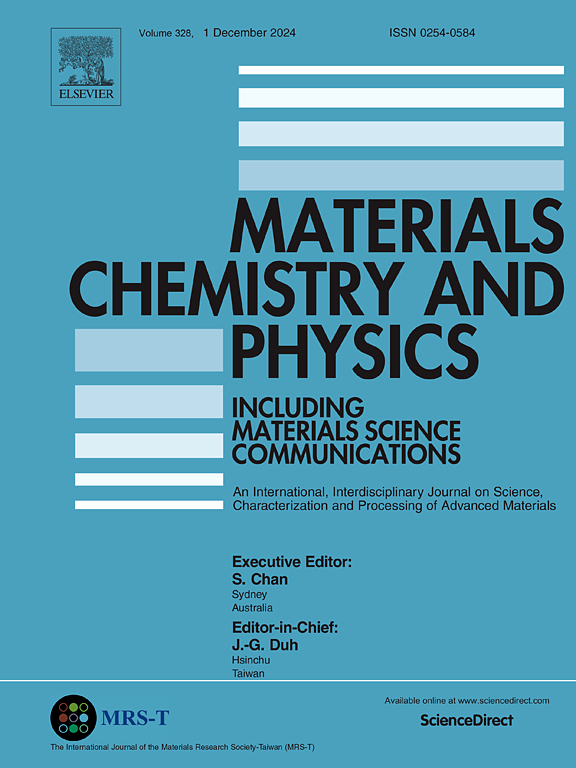Sulfur-doped g-C3N4/Polycaprolactone nanofibers based smart sensor for 8-hydroxy-2′-deoxyguanosine biomarker monitoring
IF 4.3
3区 材料科学
Q2 MATERIALS SCIENCE, MULTIDISCIPLINARY
引用次数: 0
Abstract
The compound 8-hydroxy-2′-deoxyguanosine (8-OHdG) is a key byproduct of oxidative DNA damage and is widely recognized as an important biomarker for assessing DNA oxidation levels. This study presents a label-free, low-cost, smart sensor that can improve evaluation, tracking, and survival rates by allowing for an early assessment of cancer. Herein, we fabricate sulfur-doped graphitic carbon nitride (S-gC₃N₄) embedded in polycaprolactone (PCL) for highly efficient monitoring of 8-OHdG. The S-gC3N4 offers functional groups such as sulfur and nitrogen that facilitate strong binding interactions with 8-OHdG. Comprehensive techniques are utilized to investigate the S-gC3N4/PCL nanocomposite. Interestingly, the S-gC3N4/PCL nanocomposite demonstrates strong electrochemical responses to the oxidation of 8-OHdG, with a low detection limit across a wide dynamic concentration range (1 nM–50 μM). Additionally, it exhibits good durability, selectivity, reusability, and repeatability. The developed sensor has the potential to quantify 8-OHdG levels in individuals and can be used to evaluate oxidative DNA damage and risk factor for cancer. Furthermore, the S-gC₃N₄/PCL-based sensor is successfully tested to determine 8-OHdG levels in human serum samples.
基于掺硫 g-C3N4/Polycaprolactone 纳米纤维的智能传感器,用于监测 8-羟基-2′-脱氧鸟苷生物标记物
化合物 8-羟基-2′-脱氧鸟苷(8-OHdG)是 DNA 氧化损伤的主要副产物,被公认为评估 DNA 氧化水平的重要生物标志物。本研究提出了一种无标记、低成本的智能传感器,通过对癌症进行早期评估,可以提高评估、跟踪和存活率。在本文中,我们制作了嵌入聚己内酯(PCL)的掺硫氮化石墨(S-gC₃N₄),用于高效监测 8-OHdG。S-gC3N4 具有硫和氮等功能基团,可促进与 8-OHdG 的强结合相互作用。我们利用综合技术对 S-gC3N4/PCL 纳米复合材料进行了研究。有趣的是,S-gC3N4/PCL 纳米复合材料对 8-OHdG 的氧化反应具有很强的电化学响应,在很宽的动态浓度范围(1 nM-50 μM)内检测限很低。此外,它还具有良好的耐用性、选择性、可重复使用性和可重复性。所开发的传感器具有量化个人体内 8-OHdG 水平的潜力,可用于评估氧化 DNA 损伤和癌症风险因素。此外,基于 S-gC₃N₄/PCL 的传感器还成功地测定了人体血清样本中的 8-OHdG 水平。
本文章由计算机程序翻译,如有差异,请以英文原文为准。
求助全文
约1分钟内获得全文
求助全文
来源期刊

Materials Chemistry and Physics
工程技术-材料科学:综合
CiteScore
8.70
自引率
4.30%
发文量
1515
审稿时长
69 days
期刊介绍:
Materials Chemistry and Physics is devoted to short communications, full-length research papers and feature articles on interrelationships among structure, properties, processing and performance of materials. The Editors welcome manuscripts on thin films, surface and interface science, materials degradation and reliability, metallurgy, semiconductors and optoelectronic materials, fine ceramics, magnetics, superconductors, specialty polymers, nano-materials and composite materials.
 求助内容:
求助内容: 应助结果提醒方式:
应助结果提醒方式:


